This project is critically important to providing adequate healthcare services to vulnerable populations in Fort Nelson, BC. Much of the healthcare transportation services located in Fort Nelson, or travelling to Fort Nelson, are available on a limited basis. This has left those without transportation, those who are isolated, and those who lack necessary services in a troubling position. We believe that Fort Nelson’s strong focus on community offers a unique opportunity for community collaboration with governmental health services and local government. This project’s dual benefit is strengthening community ties and providing necessary medical transportation services to those requiring assistance.
How we got here:
In understanding the needs of the Fort Nelson community, our team researched Fort Nelson’s history, news stories, and available resources from community reports including Indigenous communities of Fort Nelson First Nation and Prophet River. The following PDF illustrates our findings and understanding of the community that led us to develop this Pilot Project.
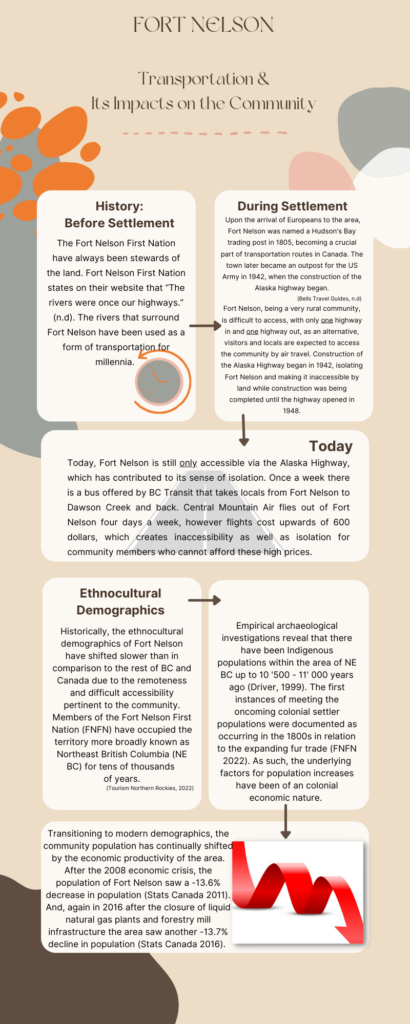
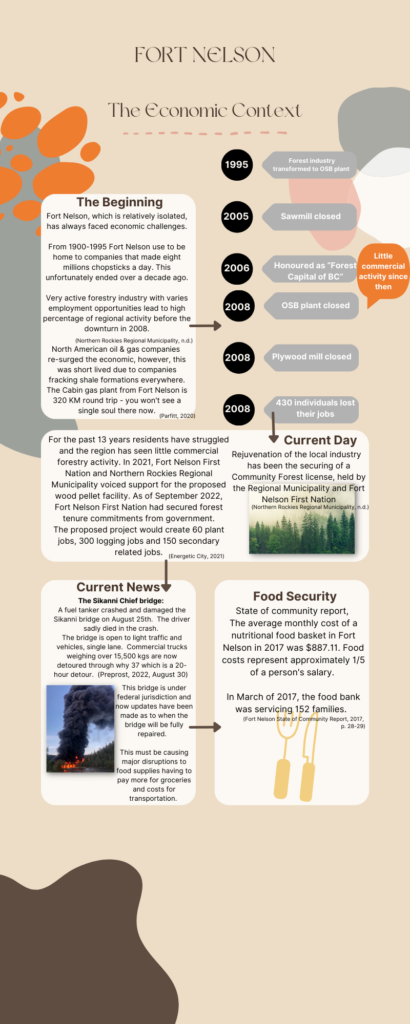
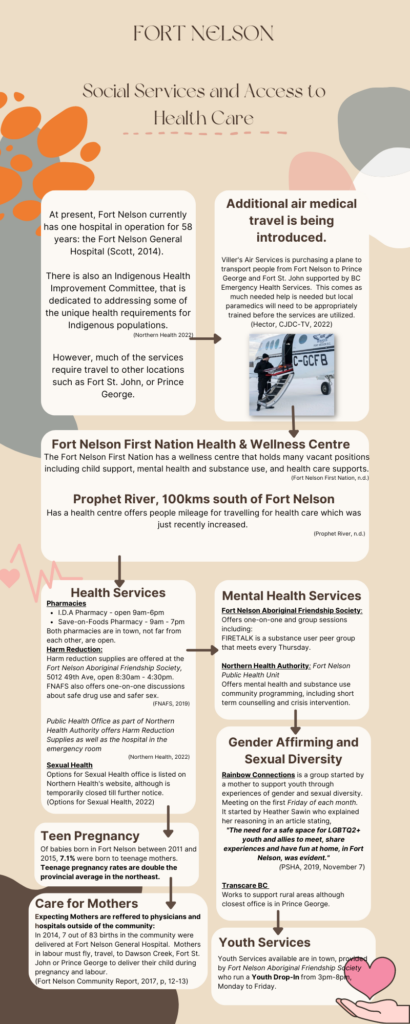
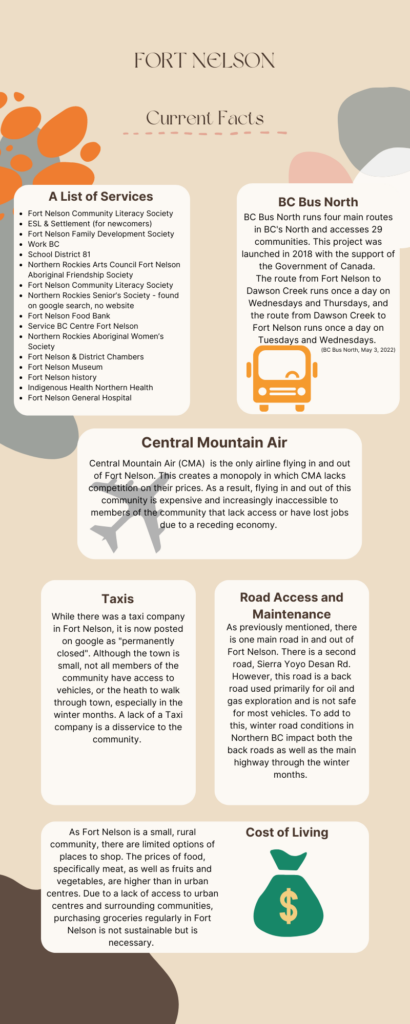
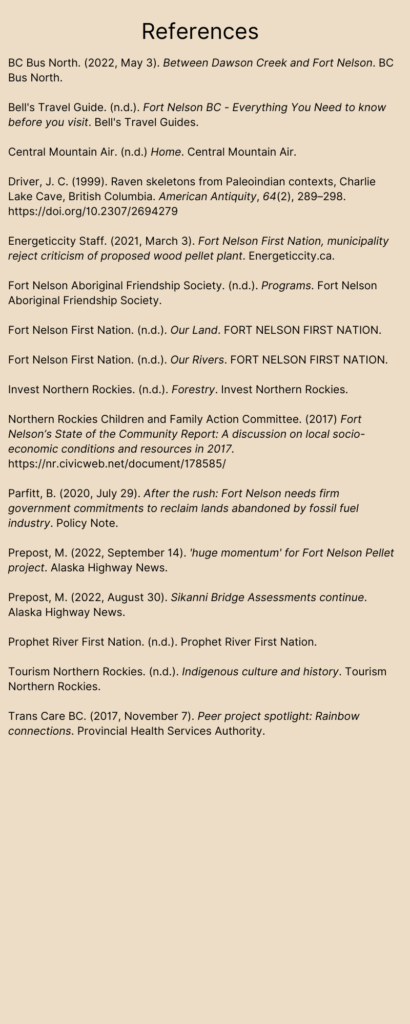
Helpful frames of reference:
Following these links below, you can learn a little bit more about the inspiration for this project, as well as examples of how similar ideas have been implemented in other communities.
Arcury, T. A., Preisser, J. S., Gesler, W. M., & Powers, J. M. (2005). Access to transportation and health
care utilization in a rural region. The Journal of rural health: official journal of the American Rural Health Association and the National Rural Health Care Association, 21(1), 31–38. https://doi.org/10.1111/j.1748-0361.2005.tb00059.x
Clément, A.-P., Djilas, D., Vinet, T., Aubin, A., Demers, K., & Levasseur, M. (2018). Identification and feasibility of social participation initiatives reducing isolation and involving rural older Canadians in the development of their community. Aging Clinical & Experimental Research, 30(7), 845–859. https://doi.org/10.1007/s40520-017-0849-x
Choi, M., Schoenburg, N. E., & Schuster, A. M. (2019). Solutions to the challenge of meeting rural transportation needs: Middle-aged and older adults’ Perspectives. Journal of gerontological social work. Retrieved October 20, 2022, from https://pubmed.ncbi.nlm.nih.gov/30727857/
First Nations Health Authority, L., & Island Health. (2020). Rural and remote Indigenous COVID-19 response framework: A framework for the provision of testing, clinical pathways, patient transport, tools and resources to support a rural, remote and First Nations COVID-19 Response. FNHA and Island Health. https://medicalstaff.islandhealth.ca/sites/default/files/covid-19/rural-and-remote/rri-covid-19-framework.pdf
Kornelsen, J., Khowaja, A. R., Av-Gay, G., Sullivan, E., Parajulee, A., Dunnebacke, M., Egan, D., Balas, M., & Williamson, P. (2021). The rural tax: comprehensive out-of-pocket costs associated with patient travel in British Columbia. BMC Health Services Research, 21(1), 854. https://doi.org/10.1186/s12913-021-06833-2
Kotani, K., (2020). Transportation Issues in Rural Healthcare. Journal of preventive medicine and public health, Yebang Uihakhoe chi, 53(2), 149–150. https://doi.org/10.3961/jpmph.20.038
Mirza, N. A., & Hulko, W. (2022). The complex nature of transportation as a key determinant of health in primary and community care restructuring initiatives in rural Canada. Journal of Aging Studies, 60, 1-6. https://doi.org/10.1016/j.jaging.2022.101002
Pearson, K. B., & Shaler, G. (2017). Community paramedicine pilot programs: Lessons from Maine. Journal of Health and Human Services Administration, 40(2), 141–185. http://www.jstor.org/stable/44631858

